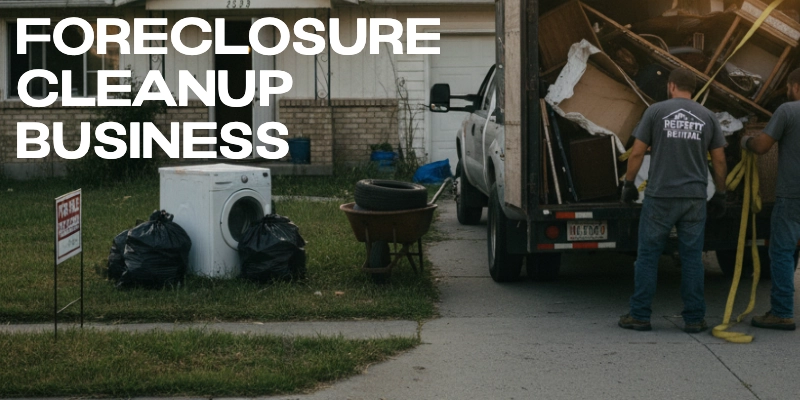
Starting a foreclosure cleanup business—often called an REO trash-out or property preservation business—can be profitable. But it’s more than hauling junk. The work comes with challenges and upsides you don’t always see from the outside.
Before you dive in, here’s a realistic look at the pros and cons.
The Challenges: What to Expect
-
Waiting to Get Paid Can Strain Your Cash Flow
The payment cycle is the big hurdle. Banks and asset management companies (AMCs) often take 90, 120, or more days to pay an invoice. If you don’t have enough operating cash for fuel, payroll, and dump fees for a few months, that delay can sink a small business before it gets going.
-
You’re Only as Good as Your Crew
As you grow, you’ll hire employees or bring on subcontractors (“subs”). Your reputation rides on their work. If a crew shows up late, cuts corners, or damages a property, it’s your business that takes the hit. If someone gets hurt, your insurance takes the hit too.
-
This Is a Long Game
The foreclosure cleanup business isn’t a get-rich-quick play. You win by building a solid reputation and earning repeat work from the same clients. Focus on relationships with real estate agents, brokers, and asset managers. You don’t just want foreclosure calls—you want to be their go-to contractor for repairs and maintenance on regular listings too.
-
The Paperwork Never Stops
This work is documentation-heavy, and staying organized is how you get paid. Every job needs bids, contracts, signed work orders, receipts for materials, detailed invoices, and solid before-and-after photo documentation to prove you met spec. If your paperwork’s messy, expect delays—or denials.
-
It’s Hard, Dirty Work
Foreclosure cleanup is physical. Early on, you’ll do most of it yourself. That can mean hauling water-logged furniture out of flooded basements, dealing with pests, or working in properties with no electricity or running water. It’s tough work, and it isn’t for everyone.
The Advantages: Why It’s a Great Business
-
Low Startup Costs
You don’t need a huge investment. You’ll need a reliable truck or van, basic tools (you may already own many of them), a business license, and the right insurance. You can start small with lawn maintenance, debris removal, and interior cleaning. As jobs stack up and cash flow improves, add specialized equipment.
-
You’re in Control
It’s your business, so you set the pace. Stay lean as a solo operator to keep overhead low, or scale by hiring crews, taking on more clients, and widening your service area. Growth is up to how you run it.
-
Invoice Factoring Can Bridge Cash Gaps
To offset long payment delays, you can factor your invoices. You sell unpaid invoices to a factoring company and get 80–90% of the value in 24–48 hours. They collect from your client and send you the rest, minus their fee. For many businesses, quick cash is worth the cost.
-
You Can Run It From Home
You don’t need office space. Your truck is your mobile office, and you can handle admin from a home computer. That keeps monthly overhead low, so more revenue goes to profit and growth.
-
Steady Demand and Long-Term Work
A foreclosure wave can boost volume, but property services are always needed. Smart operators brand themselves as full-service property preservation vendors, not just “foreclosure cleaners.” Real estate is always turning over, and listings need upkeep. Yard work, minor repairs, painting, cleaning, and junk removal stay in demand for agents prepping new listings and property managers turning rentals. Choose a versatile business name and build a broad client base so you can thrive in any market.
Are you a property preservation vendor?
Join our company directory and receive notifications for new jobs in your area.
